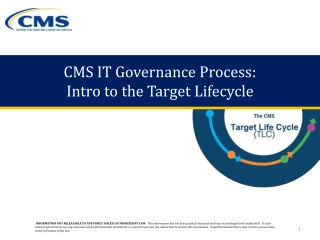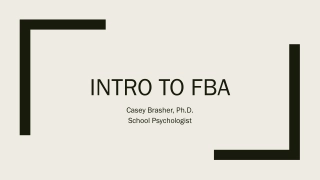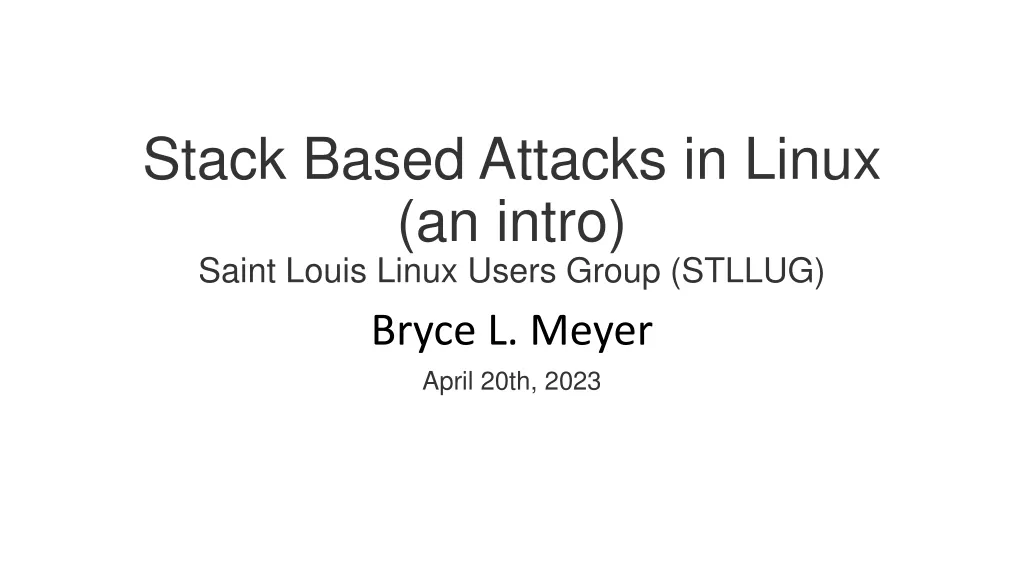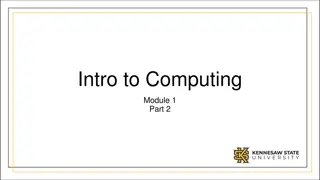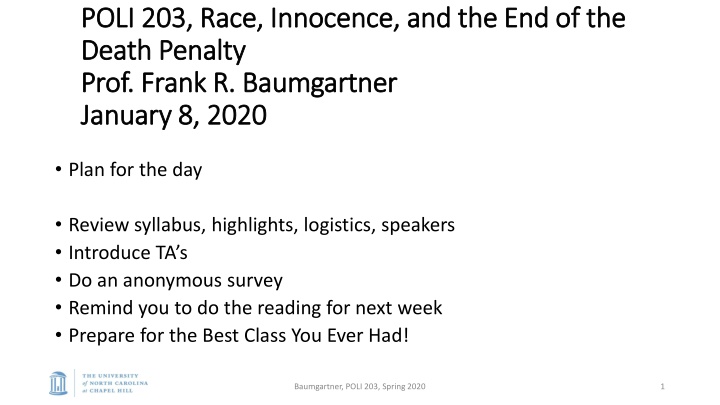
Race, Innocence, and the End of the Death Penalty - Thoughtful Insights
Explore the complexities surrounding the death penalty with a focus on support, decline, innocence, and contentious aspects like lethal injection. Approach the subject matter with respect, emphasizing the importance of engaging with ideas, not just people.
Download Presentation

Please find below an Image/Link to download the presentation.
The content on the website is provided AS IS for your information and personal use only. It may not be sold, licensed, or shared on other websites without obtaining consent from the author. If you encounter any issues during the download, it is possible that the publisher has removed the file from their server.
You are allowed to download the files provided on this website for personal or commercial use, subject to the condition that they are used lawfully. All files are the property of their respective owners.
The content on the website is provided AS IS for your information and personal use only. It may not be sold, licensed, or shared on other websites without obtaining consent from the author.
E N D
Presentation Transcript
POLI 203, POLI 203, Race, Innocence, and the End of the Race, Innocence, and the End of the Death Death Penalty Penalty Prof. Prof. Frank R. Baumgartner Frank R. Baumgartner January 8, 2020 January 8, 2020 Plan for the day Review syllabus, highlights, logistics, speakers Introduce TA s Do an anonymous survey Remind you to do the reading for next week Prepare for the Best Class You Ever Had! Baumgartner, POLI 203, Spring 2020 1
Syllabus Get used to these web sites: http://fbaum.unc.edu/teaching.htm http://fbaum.unc.edu/books/DeadlyJustice/index.html http://fbaum.unc.edu/ Baumgartner, POLI 203, Spring 2020 2
The puzzle: General support, but low and declining use of the death penalty Innocence, cost, lethal injection controversies have caused a crisis for the death penalty. On the other hand, many people support it, and historically a majority generally have supported it. Many politicians are jittery about expressing opposition to it. Many forcefully support killing the worst of the worst. We ll explore all these trends with a focus on facts. Baumgartner, POLI 203, Spring 2020 3
Respect and difficult subject matter The entire class is one big trigger: horrific crimes, terrible injustices, personal stories of torture, the list goes on. So we need to be careful with the content and the material. Take a break sometimes. The class also deals with a controversial subject matter where people disagree at very basic levels. So we need to practice our skills of respectful engagement. That means listening, first. Second, expressing oneself clearly. Third, engaging with ideas, not the people stating them. These are important lessons for other areas as well. Baumgartner, POLI 203, Spring 2020 4
Our own opinions The class is NOT about whether we support or oppose the death penalty and why. It is about learning the facts about how the death penalty works, really, in practice, as compared to how one might like to assume it should work. That s a generalizable skill that I highly recommend. Baumgartner, POLI 203, Spring 2020 5
Patriotism and faith in the system It s all fine and good to believe in rainbows, happiness, and unicorns. In this class, however, we re not looking at those happy things. In fact, the distressing elements of this class can be overwhelming, and they can make you lose faith. My attitude, and I hope one you can accept: We cannot make the system better by focusing on rainbows, unicorns, and happy outcomes. We can only improve the system by looking at its worst flaws, and correcting those. Then the next worst ones, and correct those, and so on. It s hard work, can be depressing, but we struggle on in an attitude of continual improvement. Baumgartner, POLI 203, Spring 2020 6
Political science We ll definitely address some important concepts in political science: Federalism: why do states get to decide? Why not have one nation under law ? Public opinion and representative democracy: Should the punishment for murder depend on the public mood? Race, poverty, gender, other identities, and discrimination: How much proof is needed / should be needed to make something unconstitutional because of its disparate impact on different groups? And more: No end to the theoretical questions we will pose. Baumgartner, POLI 203, Spring 2020 7
Assignments Two fantastic books for everyone to read: Baumgartner, Frank R., Marty Davidson, Kaneesha R. Johnson, Arvind Krishnamurthy, and Colin P. Wilson. 2018. Deadly Justice: A Statistical Portrait of the Death Penalty. New York: Oxford University Press. Rachlin, Benjamin. 2017. Ghost of the Innocent Man: A True Story of Trial and Redemption. New York: Little, Brown and Company. Baumgartner, POLI 203, Spring 2020 8
One additional book to read, depending on your TA. All the books are fantastic. Yes, you can choose to read more than one; it will not kill you! Woodfox, Albert. 2019. Solitary. Marlowe, Jen, and Martine Davis-Correia, with Troy Davis. 2013. I Am Troy Davis. Temple, John. 2009. The Last Lawyer: The Fight to Save Death Row Inmates Grisham, John. 2006. The Innocent Man. Liebman, James S., Shawn Crowley, Andrew Markquart, Lauren Rosenberg, Lauren White, Daniel Zharkovsky. 2014 The Wrong Carlos: Anatomy of a Wrongful Execution. Hinton, Anthony Ray, with Lara Love Hardin. 2018. The Sun Does Shine: How I Found Life and Freedom on Death Row. Prejean, Sister Helen. 2005. The Death of Innocents: An Eyewitness Account of Wrongful Executions. Baumgartner, POLI 203, Spring 2020 9
Assignments (more details on the syllabus) Attendance and participation 1500 word paper on the book you read in section, but on a particular aspect of the book as assigned / agreed to by your TA 1500 word paper on an element of the death penalty from Deadly Justice that you choose to explore in greater detail, with approval by your TA Helping to prepare a presentation on the book you read in section Quizzes Attendance at evening lectures Final exam Baumgartner, POLI 203, Spring 2020 10
The collective presentations Weeks 13 and 14, April 6 to April 15, the class lecture time will be used by groups of students, led by their TA but with maximum student involvement 20 minute PPT presentations Facts of the case How the wrongful conviction occurred How the exoneration occurred Generalizable lessons from the case With some variance from this general model depending on the book. So, you will read just one of those 7 books, but you will all learn about the other six as well. We ll then discuss their collective lessons. Baumgartner, POLI 203, Spring 2020 11
Guest speakers I m using all my connections to make this class as interesting as possible. (The university is spending some money to help as well!) In-class speakers include: The judge from the Racial Justice Act Two of the key players from the book, Ghost of an Innocent Man The director of the Death Penalty Information Center in Washington DC Baumgartner, POLI 203, Spring 2020 12
Attendance at the evening speakers events You need to go to these, period. Bring your friends. Have a good time. But do not skip them. As in the syllabus: One missed speaker, ok Two missed speakers: - 5 points of your final grade (1/2 a letter grade) Three missed speakers: -10 points (one full letter grade) These are the most important elements of the course, by far. http://fbaum.unc.edu/teaching/POLI203_Sp20/poli203-sp20- speakers.html Baumgartner, POLI 203, Spring 2020 13
Possible visits to Central Prison Depending on student interest and cooperation with the Central Prison in Raleigh, I will organize group visits to the prison, which includes death row and the execution chamber. 29 students and an instructor at a time Only on Friday mornings, leave here at 8am, return around noon. (Also Monday mornings, but that s when we have class) Perhaps during spring break, study days, exam week, immediately after the semester. Entirely voluntary. More details later Baumgartner, POLI 203, Spring 2020 14
Please review the syllabus for more details Grading policy, disabilities, plagiarism / honesty. Ask me questions or talk with your TA to make sure you understand. Section locations, TA s, book assignments for each section, TA emails and office hours, all that is in the syllabus Baumgartner, POLI 203, Spring 2020 15
Introducing our team of TAs and graders Teaching Assistants: Lauren Bauman, <lebauman@live.unc.edu> Christian Caron, <cjcaron@unc.edu> Tyler Ditmore, <tditmore@live.unc.edu> Isaac Mehlhaff, <mehlhaff@live.unc.edu> Sean Norton, <stnorton@live.unc.edu> Kevin Roach, <kevroach@live.unc.edu> Philip Warncke, <pwarncke@live.unc.edu> Graders: Colin Case, <crcase@live.unc.edu> Begum Icelliler, <bebegum@email.unc.edu> Baumgartner, POLI 203, Spring 2020 16
Now, an anonymous survey 11 questions about the death penalty taken from the Gallup Poll. Your answers are of interest so we can compare them to national polls. 20 (or so) questions about factual knowledge. Please don t stress over these. Certainly don t google anything! Just give a quick response and move to the next one. You have not taken the course yet so you don t need to know these things. I just want to assess the state of the field before we start. Note: Completely anonymous; we cannot track responses If you have no idea, skip the question. But feel free to guess. Please take enough time to finish, but don t over-think the answers. When you are done, you may leave. https://unc.az1.qualtrics.com/jfe/form/SV_3sZgZfhNi7g1VwF Baumgartner, POLI 203, Spring 2020 17

